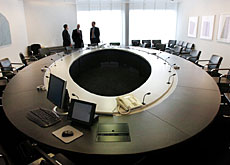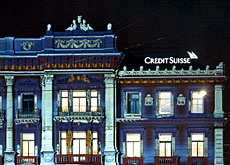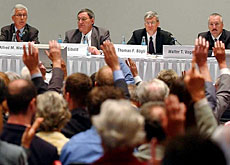Widening wage gap favours bosses

The salary gap between executives and workers is growing wider with bosses getting much higher pay rises than shop-floor employees last year, unions have claimed.
Trade union umbrella body Travail Suisse said top managers pocketed wage hikes 80 times higher than those of ordinary workers between 2003 and 2006. The largest union, Unia, said the gap grew 12.6 per cent last year.
Travail Suisse president Hugo Fasel warned companies that they face government intervention if they allow the “rip-off” situation to continue unchecked.
“Whoever believes that politicians will not sooner or later react to excessive pay increases cannot escape the accusation of being naïve or politically blind,” he said.
“People who do not know how to handle freedom risk provoking a backlash: less freedom, new regulations and more state intervention.”
The Travail Suisse research revealed that the bosses of 28 large Swiss firms were awarded an average 19 per cent in pay increases in 2006. Executives at technology company OC Oerlikon topped the table with a 109 per cent hike.
Wage policy defended
Taking inflation and the cost of living into account, top managers’ pay increased 66 per cent on average between 2003 and 2006 while lower ranked workers received rises of just 0.8 per cent in real terms.
Unia, measuring pay awards at 43 firms, showed that managers earned 65 times more than ordinary employees last year, compared to 58 times in 2005.
The latest figures have added fuel to the “fat cat” boss debate in Switzerland, leading to increasing demands for across the board salary increases for lower paid employees.
However, Swiss Business Federation (economiesuisse) chief economist Rudolf Walser defended the general wage policies of companies.
“Our companies know that if business is going well then employees have the right participate in the profits in a fair way. Statistics show that overall companies live up to this principle,” he told swissinfo.
“It is the interests of every company that their employees are satisfied and motivated.”
Economic pressures
Unia has stated it will repeat calls for a three per cent increase in real wages for workers at the next round of negotiations in the autumn.
But Walser believes that the renewed appetite of unions to demand higher wages for the majority of Swiss workers should have no adverse effects on the economy.
“This is a ritual that we go through every year since it is the task of unions to demand higher wages. It is legitimate to present these demands, but whether it is sensible or not is another question,” he said.
“There is no optimal blanket wage increase for the whole Swiss economy and there is no explicit fear of inflationary pressure from the wage front.”
swissinfo, Matthew Allen with agencies
Annual development of the average Swiss salary in real terms (minus inflation):
2000: – 0,3%
2001: + 1,5%
2002: + 1,1%
2003: + 0,8%
2004: + 0,1%
2005: – 0,2%
Travail Suisse analysed the pay policy at 28 of Switzerland’s largest firms, including UBS and Credit Suisse banks, pharmaceuticals Roche and Novartis, food manufacturer Nestlé and technology firms ABB and OC Oerlikon.
Managers at these companies took home a combined salary of SFr199 million ($162 million) in 2006 – a SFr19 million or 19% increase from 2005.
The top earners include Novartis CEO and chairman Daniel Vasella (SFr35.2 million), UBS chairman Marcel Ospel (SFr26.6 million), Roche CEO & chairman Franz Humer (SFr21.6 million) and Nestlé CEO & Chairman Peter Brabeck (SFr17.5 million).
The head of a small Swiss company has launched a popular initiative to combat the excessive salaries of top managers at publicly listed companies, accusing Swiss executives of greed and a lack of moderation.
Supporters of this initiative claim that government plans to revise company laws do not go far enough and are demanding an increase in shareholder rights.
The initiative demands that company general assemblies set salaries, bonuses and other benefits of top management and directors. It is also insisting that shareholders be given the opportunity to elect the management team on an annual basis.

In compliance with the JTI standards
More: SWI swissinfo.ch certified by the Journalism Trust Initiative



You can find an overview of ongoing debates with our journalists here. Please join us!
If you want to start a conversation about a topic raised in this article or want to report factual errors, email us at english@swissinfo.ch.